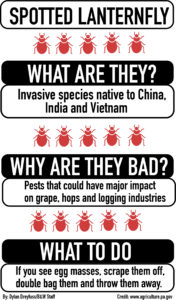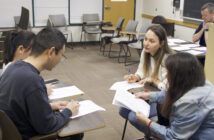A little bug with bright red spots has buzzed onto campus this semester.
The Spotted Lanternfly — an invasive insect — is making its way through parts of Pennsylvania after first appearing in Berks County in 2014.
Marcos Lozano Mendez, ’19, said he has seen a lot of the insects around Building C on Mountaintop Campus as well around Fairchild-Martindale Library.
“If you kill individual ones, it’s not going to do much,” Mendez said. “Instead, we should be trying to kill the egg masses, which would be more beneficial than actually stomping on them.”
According to the Pennsylvania Department of Agriculture, the insect is native to China, India, Vietnam and Korea. It can now be found in southeastern Pennsylvania, which has been designated a quarantine area to stop the spread of the pest. Lehigh is located in the middle of the quarantined area.
Although the Department of Agriculture indicated that Spotted Lanternflies aren’t dangerous to humans, they inflict harm in other ways.
Gary Falasca, the director of custodial-grounds at Lehigh, said the insects are known to uncontrollably eat through the bark of many economically important fruit trees, including the Ailanthus. Commonly known as the “Tree of Heaven,” the Ailanthus is also native to China.
Dork Sahagian, a professor of earth and environmental science, said the insects harm the vascular system and function of certain trees.
Sahagian said the insect is known to dig through tree bark to draw out sap, coating leaves and the trees themselves in a sugary fluid. The sap then attracts a black mold that dangerous to trees. This could also prove harmful to insect species that use the trees for food and shelter.
Falasca said no approved treatment to control the population of Spotted Lanternflies exists at this time, however, Pennsylvania State University is conducting research to determine an effective way to limit the species.
As part of its research, Pennsylvania State University asks Pennsylvania residents to identify sightings of the insect on an online state map. This way, researchers can track the migration of the population.
 Falasca said if approved, Lehigh will treat trees with a substance called safari that will eliminate the nymphs before they mature and reproduce.
Falasca said if approved, Lehigh will treat trees with a substance called safari that will eliminate the nymphs before they mature and reproduce.
The problem with safari, or any other chemical, is that it’s “off label.”
“When these things are marketed and sold, they’re approved for certain types of insects,” Falasca said. “None of this is going to say lanternflies because it’s still in the research phase.”
Moyer Pest Control, a local exterminator, has tried Alpine WSG, a common deterrent used on ants, wasps and stink bugs. The deterrent is not harmful to humans or pets.
Falasca said he isn’t convinced the product is having any impact on the adult lanternflies. Since the lanternflies do not have a known natural predator, Falasca said he doesn’t know how to combat the problem.
“An ecosystem evolves over millions of years to be in equilibrium,” Sahagian said. “Birds around here aren’t interested in eating lanternflies.”
According to the Department of Agriculture’s website, the eggs of the Spotted Lanternfly are laid in late fall and hatch in the spring. Egg masses are laid on hard surfaces and protected with a mud-like covering. Each egg mass contains 30–50 eggs.
“What the exterminator told me is that they’re susceptible to cold weather,” Falasca said. “So, they expect the adults to die off once the weather turns cold, but the egg sacs where the nymphs are live through the winter and then they’ll hatch as the weather gets warmer.”
If this pattern holds true, the population will grow next year. Despite the severity of the situation, Joan Ramage Macdonald, a professor of earth and environmental science, said there is a way Lehigh students can help.
“The spotted Lanternfly seems to be all over this area, and I have really noticed them around STEPS and Maginnes,” Macdonald said in an email. “People should kill them by stomping on them and give it more than one try because although they are fast, they tire quickly.”





Comment policy
Comments posted to The Brown and White website are reviewed by a moderator before being approved. Incendiary speech or harassing language, including comments targeted at individuals, may be deemed unacceptable and not published. Spam and other soliciting will also be declined.
The Brown and White also reserves the right to not publish entirely anonymous comments.